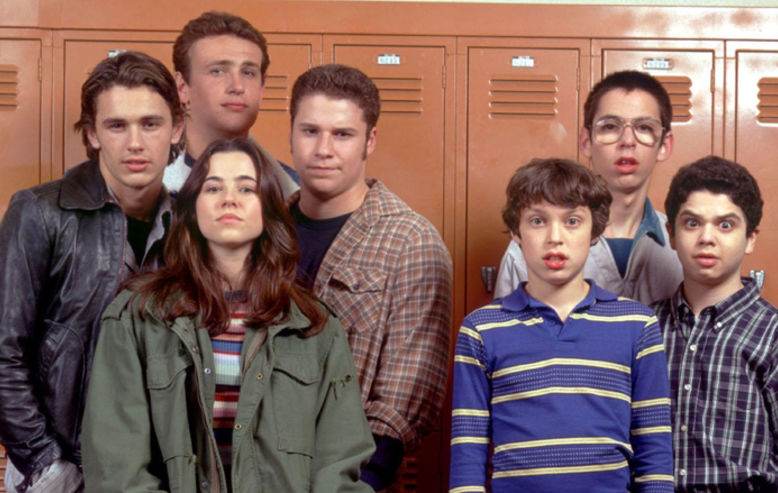This article is from our friends at Trunkworthy
Freaks And Geeks, in high-school terms, was an outcast pipsqueak who grew up to be the King of Cool. Unfortunately, few people can say, “I knew it when.” That’s partly because NBC, like any schoolyard bully, shoved the series all over prime time then stuffed it into a Saturday-night locker where no one would ever find it. Consequently, it died during its initial 1999-2000 run. Heck, only a fan-fueled blitzkrieg spurred the Peacock network to broadcast 15 of its 18 episodes.
Its posthumous revenge, of course, was sweet, and awful fun to watch. Freaks And Geeks carried a comedic DNA that would so dominate the aughts that its cancellation ranks right up there in cultural boneheadedness with telling The Beatles to scram. Creator Paul Feig went on to direct Bridesmaids and The Heat, and executive producer Judd Apatow built his own empire, releasing box-office hit after box-office hit, from The 40-Year-Old Virgin to This Is 40. His very name, in fact, mutated into shorthand for a certain kind of man-child sentimentality: “Apatovian.”
And, my God, that cast: Linda Cardellini, James Franco, Jason Segel, Seth Rogen, John Francis Daley, Martin Starr, Busy Phillips and Samm Levine. Some joined and prospered within Apatow’s big-screen stable. Others revealed multiple talented depths. Franco went from unkempt heartthrob to unkempt heartthrob/writer/movie star/performance artist. Rogen co-penned and co-starred in such bro-busters as Superbad, Pineapple Express, and This Is the End. (He and Franco generated a little international friction with the upcoming The Interview, raising North Korea’s hackles.) Not to be outdone, Segel scripted Forgetting Sarah Marshall and single-handedly revived the Muppets. Even John Francis Daley, the littlest geek of all, blossomed into a role on Bones and wrote the workplace-revenge comedy Horrible Bosses.
With that kind of pedigree, how could Freaks And Geeks have failed? Unfortunately, it landed during a teen-soap renaissance, where adolescence glowed with outsized drama and porcelain complexions. Freaks And Geeks, however, captured those years exactly as you lived them—awkward, confused, suburban—and it made the experience uncomfortably, frighteningly hilarious. And rather than being chiseled from post-pubescent fantasy, its main cast consisted (mostly) of genuine kids: blemished, gawky, sarcastic, and real. Their problems were more mundane—Dawson Leery would have asked a pretty girl to dance long before the fast part of Styx’s “Come Sail Away” kicked in, and Felicity’s Ben Covington wouldn’t have cared that he’d never be a kick-ass drummer like his idol, Neil Peart—but, as in most things teenage, were as urgent as life or death.
Perhaps most refreshingly, Freaks depicted geeks in a way few had ever seen; you wanted to grab your TV and kiss it. Previously, they were stereotypes, braying, sexless goons. Here they were like everyone else, trying to survive high school while navigating hallways of unrequited crushes, puberty, and ever-changing hierarchies.
And the show was authentically geeky. Who else would have cast Trace Beaulieu, Mystery Science Theater 3000’s Dr. Forrester and voice of Crow T. Robot, as a biology teacher; or Thomas F. Wilson, whose Biff Tannen terrorized Michael J. Fox’s Marty McFly through three “Back to the Futures,” as a P.E. instructor?
The most inspired casting choice, however, was the magnificent Joe Flaherty as family patriarch Harold Weir. The maneuver scored points with us ’80s comedy connoisseurs who loved him on SCTV, and the actor, beneath his upright exterior, brought the perfect twisted propriety to the role.
Although set in Michigan in the early 1980s—a lived-in ’80s, not a flurry of kitsch—Freaks and Geeks captured a universal sense of alienation among aliens. Yet it knew at its heart that freakdom was all-encompassing, from the spazoids and the burnouts to the prissy-pants and the prom court. Even parents and teachers weren’t exempt, because that anxiety never disappears. But it’s not a bad thing. In fact, under the right conditions, it has the potential to become something great.

